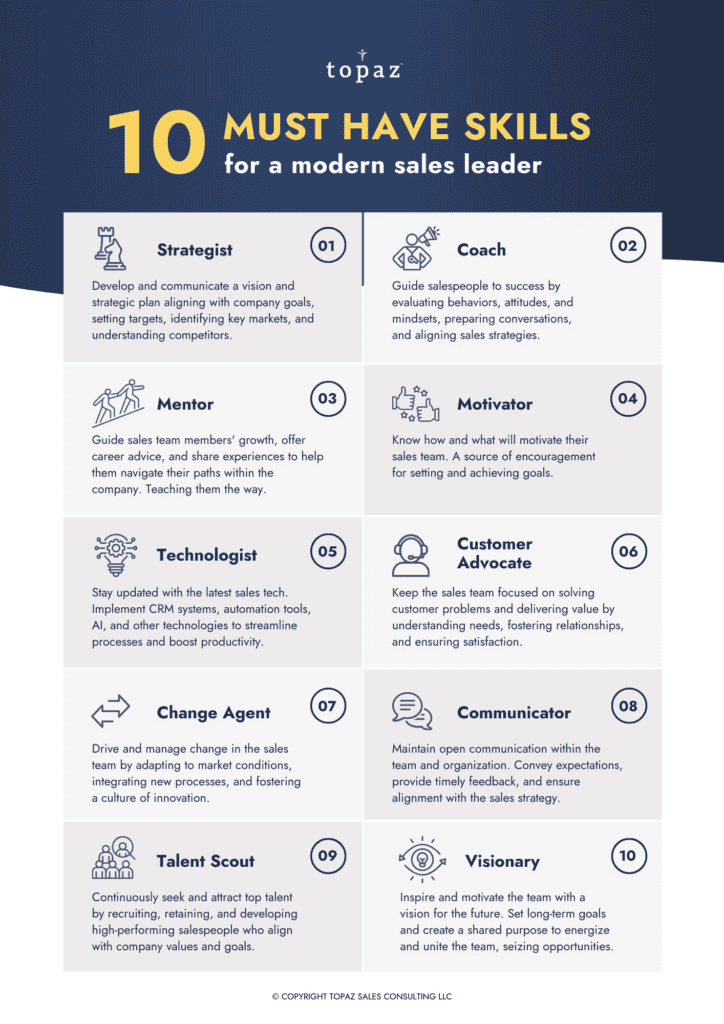Being a sales leader today is an entirely different ballgame than just a few years ago. The traditional image of a manager pushing teams to hit numbers no longer cuts it.
Modern sales leaders need a blend of soft skills, strategic thinking, and the ability to embrace new technology. Gone are the days when a leader’s job was to shout from the sidelines, demanding results.
A modern sales leader’s focus these days is creating a vision, motivating the team, and adopting the latest tools and strategies to stay ahead of the competition. For those leading a large team or even if you’re just getting started, mastering these ten must-have skills will help you transform your leadership game.
Top Sales Leadership Traits
1. Strategist
A modern sales leader isn’t just a “numbers person”, although numbers are still important.
They need to be a strategist who develops and communicates a vision for their team that aligns with company goals. Whether identifying new market opportunities, setting clear targets, or understanding competitors, being a strategist is about seeing the bigger picture.
Scenario: Imagine your company wants to break into a new geographic market. As a strategist, you don’t just tell your team to go after it blindly. You’ll create a clear plan: understanding the local competition, identifying the target audience, and mapping out both a short and long-term strategy that includes market penetration and relationship-building efforts.
2. Coach
Being a modern sales leader means more than just managing. You must act as a coach who guides your team to success by evaluating behaviors, attitudes, and mindsets. It’s not enough to throw a quota at your sales reps and expect results — sales leaders need to invest time in understanding their strengths and areas for improvement.
Example: A coach identifies a rep who struggles with closing deals. Instead of telling them to “close better,” you sit down with them, observe their sales conversations, and guide them on handling objections. You help them align their strategy to be more effective, and suddenly, they’re closing deals they used to lose.
Quick Tips for Effective Coaching:
- Conduct regular one-on-ones focused on development, not just performance reviews.
- Align individual and team goals with broader company objectives.
- Use active listening to understand the unique challenges each salesperson faces.
Read — Sales Coaching 101: Strategies to Improve Performance and Efficiency
3. Mentor
A mentor is more than a coach. While coaching focuses on immediate results, mentoring is about long-term career development. As a mentor, you offer advice, share experiences, and help your team members navigate their career paths within the company.
Scenario: You notice a talented salesperson with leadership potential but lacking confidence in taking the next step. As their mentor, you share your journey of overcoming self-doubt and offer actionable advice for developing leadership skills. Over time, you guide them to take on more responsibility, positioning them for a future leadership role.
Takeaway: Mentoring builds loyalty, prepares your organization’s next generation of leaders, and sets you up for long-term success.
4. Motivator
Every team needs a motivator — someone who understands what drives each team member. Motivation isn’t a one-size-fits-all approach. The best sales leaders know how to inspire their team through recognition, rewards, or simply reminding them of the bigger picture.
Example: After a tough quarter, morale is low. As a motivator, you don’t just talk about hitting targets — you bring energy back into the room. You recognize individual contributions, celebrate small wins, and remind your team of the overarching vision. With some motivation, you turn the team’s slump into renewed energy.
Bullet List of Motivation Tips:
- Personalize your approach: What motivates one salesperson might not work for another.
- Celebrate wins, no matter how small, to keep momentum.
- Align short-term achievements with long-term goals to keep motivation consistent.

5. Technologist
Sales today is as much about technology as it is about relationships. A modern sales leader needs to be a technologist who stays updated with the latest tools, including CRM systems, automation, or AI-driven analytics or tools. These tools help streamline processes, boost productivity, and allow your team to focus on what they do best — selling.
Example: You implement a new AI-driven CRM system that predicts which leads will most likely convert based on historical data. This saves your team time and allows them to focus on high-quality leads. You also introduce automation tools to streamline administrative tasks, freeing up more time for relationship-building.
Scenario: You recognize that your team spends too much time on follow-up emails, so you introduce an AI-based tool to automate personalized emails based on buyer behaviors. As a result, your team spends less time typing and more time engaging with prospects, leading to higher productivity and increased close rates.
Will AI Take Over Sales? Click here to find out.
6. Customer Advocate
The best sales leaders are customer advocates at heart. While it’s easy to get caught up in hitting quotas, the most successful leaders keep their teams focused on delivering value to the customer. By understanding customer problems and providing solutions, you build relationships that lead to long-term success.
Scenario: A client mentions their frustration with a recurring issue. Instead of pushing another sale or trying to upsell them to new products or services, you work with your team to solve that problem. This approach strengthens the client relationship and positions your team as a trusted partner rather than just another vendor.
7. Change Agent
In a fast-moving market, staying still means falling behind. That’s why a modern sales leader must be a change agent, constantly looking for ways to innovate and adapt. Introducing new sales tactics, embracing new markets, or pivoting when necessary, a great leader isn’t afraid of change — they drive it.
Example: When market conditions shift due to external factors, like a pandemic, a change agent sales leader quickly shifts the team’s strategy to focus on virtual selling and new digital tools, allowing the team to remain competitive and grow revenue during challenging times.
How to Drive Change:
- Identify critical areas in need of innovation.
- Communicate the reasons for change clearly to your team.
- Create a culture that rewards agility and adaptability.
8. Communicator
Effective sales leadership relies on communication. A modern sales leader ensures that every team member is aligned with the company’s goals and maintains open communication lines within the team. This includes giving timely feedback, conveying expectations, and ensuring the team feels heard.
Example: You hold weekly check-ins with your sales team where everyone is encouraged to share feedback and challenges. This creates an open and transparent culture and helps you identify and address potential issues early on.
9. Talent Scout
A modern sales leader knows that their success is built on the strength of their team. That’s why being a talent scout is essential. Continuously seeking out top talent and ensuring your team is composed of high-performers will keep your sales engine running smoothly.
Scenario: Instead of waiting for a job vacancy, you proactively network and engage with high-potential candidates. By building relationships early, you have a pipeline of top talent ready when it’s time to hire.
Learn more about our proprietary sales hiring training program, Metahire.
10. Visionary
Lastly, a great sales leader is a visionary. It’s not just about today — it’s about where the team is going in the future. A visionary leader sets long-term goals that inspire the team and create a shared sense of purpose.
Scenario: You create a five-year growth plan that outlines the expansion into new markets and product offerings. This roadmap keeps the team motivated and aligned with the company’s vision, ensuring everyone is working toward the same big-picture goals.
Be a Multi-Faceted Sales Leader
Being a modern sales leader means more than just hitting numbers. It’s about wearing many hats — strategist, coach, technologist, and beyond. The best leaders know how to adapt, motivate, and inspire their teams to not only meet goals but exceed them. If you’re looking to take your leadership to the next level, start by mastering these 10 must-have skills and watch your team — and your results — thrive.
FAQs
- What is the most important skill for a sales leader?
While all 10 skills are important in their own ways, the ability to be a strategist often stands out. Sales leaders must develop long-term visions that align with company goals, identify key market opportunities, and help their teams overcome complex challenges. - How can I become a better coach for my sales team?
To improve as a coach, focus on regular one-on-one meetings to understand each salesperson’s unique strengths and weaknesses. Active listening and tailored feedback are essential for guiding your team’s growth and development. - Why is technology so important for modern sales leaders?
Sales leaders must leverage CRM systems, automation tools, and AI to streamline operations and increase productivity. Embracing technology helps sales teams spend more time selling and less time on administrative tasks. - How does being a change agent help sales leaders adapt to market shifts?
A change agent drives innovation within the sales team, ensuring they can adapt to market fluctuations, new competitors, and evolving customer needs. This forward-thinking mindset keeps the team competitive and resilient during challenging times. - What role does mentorship play in sales leadership?
Mentorship focuses on long-term career growth. Sales leaders who mentor their team members help build loyalty, foster leadership potential, and position the organization for future success by developing the next generation of leaders.






